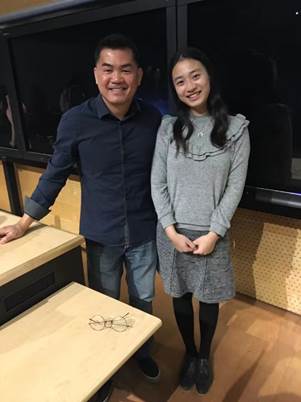Zhu Yitong -- Sharing Her Exchange Experience
and Opinions About English Major
Kiki (Zhu Yitong), junior student majoring in English, is one of the Honors students at Jiangnan University due to her excellent academic performance. She won first prize at USIEA-IELTS in 2017 and second prize at “FLTRP Cup” Speaking Contest in Jiangsu Division. During the first semester of her junior year, Kiki had done an exchange at UC Riverside.
Since many students are planning to go abroad for further study, we interviewed Kiki in order to learn more details about it. She gladly accepted our invitation and shared her application process as well as her experiences and some ideas about being an English major.
Interviewer: What did you do during the whole process, from deciding to go abroad to completing your exchange in the United States?
Kiki: I took IELTS during summer vacation after I finished my first year here. Then I prepared the paperwork for the visa application during my sophomore year. Then finally, I went to UC Riverside in the first semester of junior year. You have to prepare the exchange project by yourself though you can ask your teacher for help. Also, grades are an important factor when you apply for the school. At first I chose to apply for UCSD in San Diego. The school needed to evaluate my grades in the last five to six semesters. I was just a sophomore at the time I applied, so I had to count on my slightly lower grades in high school. I was disappointed that I didn’t pass.
Interviewer: What are the differences between schools in foreign countries and schools in China? Do they have any similarities?
Kiki: From my perspective, there are three main differences:
The first one is the curriculum. There are two forms of curriculum including lecture and discussion. Lecture is similar to a big class. It is taught by a professor at a fixed time. Discussion is generally held by one of the T.As (teaching assistant) who will guide students to discuss some problems, explain some vague concepts mentioned in class, and use various examples to support ideas in class.
The second one is the examination. I felt that they were not as strict with my studies as with their students, perhaps because they thought I was an exchange student. Foreign schools do count your usual performance including attendance, classroom participation, and sometimes a pop quiz. There is a large amount of homework and reading tasks before the final exam. For example, you have to finish reading a book in one semester and keep all the key points in mind at the same time. The pressure of studying during the exam week is heavier. Basically you have to write an essay for each course and there are a lot of things to remember.
The last one is the platform of schools. I think domestic education platform may be too small for students. The grades as well as your GPA don’t count very much for we won’t use what we have learnt in class in daily life. Some of the theories may be out of date while you will learn practical knowledge in foreign schools. Take the reading class and the grammar class in our country for example. You may spend one lesson finishing some questions while you can spend a day reading a whole chapter and finishing a summary or an essay. That is very different from the learning in our country.
Kiki: It doesn’t make any sense to compare students in one country for there are many excellent students outside school. Only by jumping out of the circle can we truly improve ourselves.
When asked if there was something impressed her most, Kiki, in a humorous tone, mentioned that she was green in cooking and often screwed up food. Besides exchanging experience, we also asked Kiki some problems that confused many students in English major.
Interviewer: It is known to us that China has a large number of English learners. Some students think it is unnecessary to choose English as a major, and they don’t regard it as a promising subject. Therefore, the majority of them will select majors related to economy if they study abroad. What’s your opinion?
Kiki: The purpose of majoring in English is to improve linguistic skills. Lessons for junior students are about basic knowledge; senior students learn how to apply those linguistic knowledge. However, good curriculum may produce different effects in different schools.
A common learning method is reciting. For example, students need to remember each unit’s vocabulary. However, the key to learning words is that we should put one word in context then comprehend and learn it. So I think we should learn language by ourselves not through teachers. What’s more, language is updating in a fast pace in today’s modern society. Sometimes, it’s hard for teachers to keep up with it, let alone students. If you don’t browse Twitter and watch the news for three days, you may miss some up-to -date words and expressions. Some of the passages in our textbooks are quite outdated as they were written several years ago. So the words and expressions used are no longer relevant. In foreign universities, professors demand students buy the latest textbooks. A student having command of 15,000 words can understand any passage in the textbook. But whether he/she can understand passages in the The New York Times is hard to say. Generally speaking, a person who is really good at English can read any materials without difficulty.
Interviewer: So that is to say except those who study English literature, the words and expressions from textbooks are of little use in the communication with foreigners. However, what you read in the newspaper is more practical in daily life.
When you communicate with foreigners, you often use daily expressions. Advanced English is to English what the literary language used in ancient China is to Chinese. When you don’t know how to say a sentence in daily expressions, you can substitute words. So you can always convey messages to others. But formal English acquired through textbooks could only be expressed in a limited range of ways.
We learned a lot from this interview. Kiki really loves English. She has clear aim and individual perceptions on English. She knows how to study efficiently and continue to improve themselves. Every major is worth learning. No pain no gain. What we learn in the textbook is indispensable, but that is not enough. Everyone should enrich their knowledge and broaden their horizons after class. It’s important for us to develop the capabilities of self-learning and self-solving-problems. Students who wish to study abroad should make preparations early. Therefore, you can seize the chance by your competence confidently without reservation, leaving no regrets behind. We hope all our fellow students devote to what we choose and stride forward toward a better future!
Interviewer: Yuan Maoqi
Translator: Sun Ye , Chen Qing
News Editor: Jiang Yufeng, Liu Xing
Editor-in-chief: Danielle Chu









